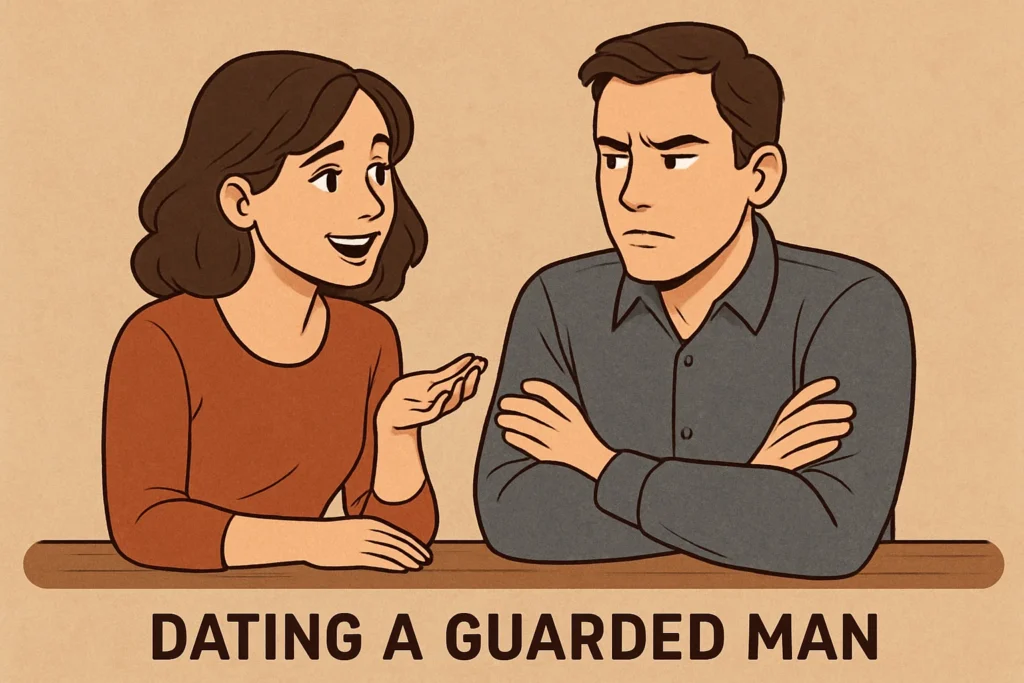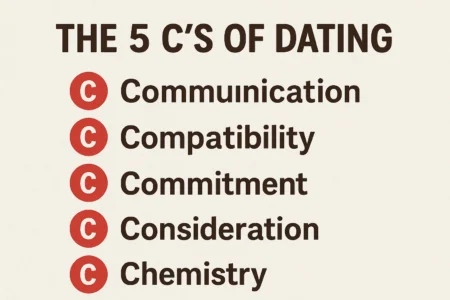Ever meet a guy who’s just… great? Funny, smart, kind… but you just can’t get in? It’s like trying to talk to someone through a thick glass door. You see him, but you can’t reach him. If that sounds familiar, you’re probably dating a guarded man. He’s got his walls up, and it’s confusing as hell.
Let’s be honest, it’s disheartening. You start wondering, “Is it me? Did I do something wrong?” Or you just figure he’s not that into you. But 99% of the time, this has absolutely nothing to do with you. It’s all about his past.
Those walls weren’t built to keep you out. They were built to protect him from something that happened a long time ago. Getting that is the single most important step. You can’t tear his walls down. That’s not your job. The real question is whether you can make him feel so safe that he’ll want to open the door himself. It’s a journey, not a quick fix. And it takes a boatload of patience.
More in Dating Specific Types Category
Key Takeaways
If you’re trying to figure out this delicate dance, here are the main things to keep in your head:
- It’s Not You, It’s Him (Really): His walls are about his old wounds, not your current worth. Taking it personally is a dead end.
- Patience, Patience, Patience: This is a marathon, not a sprint. Trust is built in tiny, consistent moments over a long, long time.
- Pressure Backfires. Every. Single. Time.: Pushing him, demanding answers, or giving ultimatums will just make him run faster.
- Be Consistent: Your superpower here is just being consistent. Be the most reliable, stable, predictable person in his life.
- Don’t Lose Yourself: You still need boundaries. Your needs matter just as much as his, and you can’t set yourself on fire to keep him warm.
What Are the Telltale Signs of a Man Who Has His Walls Up?
First, let’s make sure we’re reading the signs right. There’s a huge difference between a guy who’s “guarded” and a guy who’s “just not that into you.” A guarded man is confusing because he’ll seem interested and distant, often at the same time.
Does He Avoid Talking About His Past?
You might notice your conversations just… stay on the surface. You can talk for hours about a movie, your jobs, the news. But the second you ask a simple question about his family or an ex, the subject just… changes.
He’s not mean about it. He’s a ninja at deflecting. He’ll crack a joke or flip the question back on you so fast you don’t even notice. This isn’t just him being “private”—it’s a shield. He’s not ready to show you the parts of his story that are covered in dust and pain.
Is He Slow to Share His Feelings?
This guy lives in his head. He’ll tell you what he thinks all day long. But what he feels? Good luck with that.
“I’m fine.” “It’s nothing.” “I got it.” These are his full-stop, conversation-ending phrases. It’s not that he’s a robot. It’s that he learned, somewhere along the way, that showing his feelings was a good way to get hurt, ridiculed, or dismissed. So he just… stopped.
Does He Seem Independent to a Fault?
Oh, this is a big one. This man is Mr. Independent. He will not ask for help. Ever. He’d rather move a king-size bed up five flights of stairs alone than text a buddy.
This isn’t about strength; it’s a survival skill. His past probably taught him that the only person he can 100% count on is himself. Accepting help from you feels like a threat. It means letting you in. It means he needs you. And that is a terrifying feeling for him.
Does He Send Mixed Signals?
This is the one that’ll drive you nuts. One minute, he’s all in—warm, funny, totally present. You have an amazing date, you feel the connection, and you think, “Yes! We’re finally getting somewhere!”
The next day? Poof. He’s gone. His texts are short. He’s “busy” all week. This is the classic push-pull. The second he feels himself getting too close, his internal alarms go off, and he slams on the brakes. It’s an automatic, fear-based reaction.
What Makes a Man Become Guarded?
If you can get why he’s like this, it changes everything. You stop feeling rejected and start feeling for him. His walls aren’t there for no reason; they’re the result of his history.
Is It Because of a Bad Breakup?
This is the classic. He got his heart ripped out. A really bad breakup—maybe he was cheated on, or she just left him out of the blue. He trusted someone completely, and it blew up in his face.
The lesson he learned wasn’t, “That one person was bad.” The lesson he learned was, “Trusting anyone is stupid and dangerous.” His walls are his vow to himself that he will never, ever let anyone hurt him like that again.
Could It Be from His Childhood or Family Experiences?
Sometimes, these walls are old. Really old. If he grew up in a house where nobody talked about feelings, or where he was made fun of for being sensitive, he learned to hide.
If he was hammered with “boys don’t cry” his whole life, he has decades of practice at stuffing his emotions down. He might not even know how to name them, let alone share them. Or, if he had a parent who was unreliable or left, he learned that loving someone means risking a loss you can’t control. Being independent wasn’t a choice; it was how he survived.
Is He Simply Afraid of Getting Hurt Again?
At the end of the day, it all comes down to this: fear. He’s afraid of being rejected. He’s afraid of being betrayed. He’s afraid of being seen as “weak” or “not good enough.”
Here’s a little secret about guarded people: they often feel things more deeply than anyone else. That’s why they’re guarded. They know exactly how much it hurts when things go wrong, and they’re not sure they can go through it again. He’d rather be lonely and safe than connected and at risk.
Is It a Control Issue?
That fear often looks like a need for control. Why? Because love and feelings are messy. They’re unpredictable. When he starts to fall for you, his life feels like it’s spinning out of his control.
So he keeps you at arm’s length. He controls the pace. He controls how much he risks. He controls how much he lets you in. This isn’t about controlling you. It’s about him desperately trying to control his own “damage” if things go south.
How Can I Build Trust with a Guarded Man?
Okay, so you see the signs, you get the “why,” and you still care about the guy. Now what? Your approach from here on out is everything.
Why Is Patience Your Most Powerful Tool?
I’m saying it again because it’s that important. This is a marathon. You cannot rush him. He has spent years building these walls. He’s not going to tear them down in a few weeks just because you’re awesome.
Every time you push or get frustrated with his pace, you’re just proving his fears right. His brain screams, “See? She just wants something. She’s not patient. She’s not safe.”
Patience is your active way of quietly saying, “I’m not going anywhere. You don’t have to perform for me. You’re safe with me.” That’s the only thing that gets a brick loose.
How Does Being Consistent Show You’re Reliable?
He’s testing you. He might not even know he’s doing it. He’s watching. Does what you say match what you do? He’s just waiting for you to prove you’re like everyone else who hurt him.
If you say you’re okay with taking it slow, then be okay with it. If you’re warm and loving one day, but then he pulls back and you get cold and angry, you just became unpredictable. And unpredictable is not safe.
Be his rock. Be the same person, day in and day out. When he pulls back, your response shouldn’t be to get mad. It should be a calm, “I’m right here when you’re ready.” That consistency is what he’ll eventually learn to stand on.
Why You Should Share Your Own Vulnerabilities (Gently)
This feels backward, right? Why should you open up when he won’t? But you’ve got to show him how it’s done.
I’m not saying you should dump all your past baggage and trauma on him. That’s just more pressure. I mean sharing small, real, in-the-moment things.
- “I had such a stressful day at work, I’m feeling totally fried.”
- “I’m actually a little nervous about this party, I don’t know anyone.”
- “That was really nice, what you just did. It meant a lot to me.”
You’re showing him, “See? I can share a feeling, and the world doesn’t end. You didn’t run away. This is safe.” You’re modeling what you hope to get from him.
What Does “Creating a Safe Space” Actually Look Like?
“Safe space” isn’t just a fluffy term. It’s an environment you build with your actions. It’s about removing the threat.
- Just listen. Don’t fix. When he does share something—even if it’s tiny—your only job is to shut up and listen. No “fixing” it. No “you shouldn’t feel that way.” No “here’s what you should do.” Just a simple, “Wow, that sounds tough,” or “I get it.”
- Applaud the effort. If he tells you some small story about his high school football team, don’t flood him with a million more questions. Just be present and say, “Thanks for telling me that. I like learning more about you.” You’re rewarding the act of sharing.
- “No” is a complete sentence. If he says, “I don’t really want to talk about that,” your next move is critical. If you pout, push, or get huffy, you failed the test. The only right answer is a breezy, “No problem. Hey, you want to get pizza?” This shows him he’s in charge of his own door, and you won’t try to kick it in. That is the definition of safety.
What Actions Will Make Him Retreat Even More?
Knowing what not to do is just as important. It’s so easy to make a wrong move here, and one bad night can undo weeks of trust-building.
Why You Shouldn’t Pressure Him to Open Up
This is the biggest mistake you can make. Asking questions like, “Why won’t you talk to me?!” or “What’s your problem?” or “We’ve been dating for six months, I deserve to know!” are like throwing little grenades at him.
To you, you’re just trying to get closer. To him, you’re a threat. You’re making demands. His walls go from brick to solid steel. You cannot bully, beg, or argue your way into his heart. Pressure is like fertilizer for his walls.
Are You Taking His Behavior Personally? (And why you shouldn’t)
When he pulls back, it feels just like rejection. It’s so hard not to spiral and think, “He doesn’t like me anymore. It’s over. I must have done something.”
But the second you make it about you, you’ll react from your own fear. You’ll get needy or get mad. And that just proves his point that relationships are dramatic and painful. You have to learn to separate his behavior from your worth. It’s not personal. It’s his programming. He’s not running from you; he’s running from the feeling of being vulnerable.
Don’t Play Games or Try to Make Him Jealous
This is a terrible idea. When you’re frustrated, it’s tempting to think, “Maybe if he sees me flirting with someone, he’ll wake up and fight for me!”
This will backfire. Big time.
A guarded man isn’t going to “fight for you.” He’s going to think, “Yep. Knew it. She’s unreliable and plays games, just like the rest. Thank God I didn’t trust her.” He will see it as a lucky escape. He’ll just let you go and feel smart for never opening up.
Why Giving Ultimatums Is a Bad Idea
“You need to open up to me, or I’m out.”
This is a threat. You’re holding the relationship hostage. A guarded man will always pick his safety over the relationship. He will let you leave.
He might even be relieved. The pressure is off. You made the decision for him, and now he can go back behind his walls where it’s safe and quiet. You can’t threaten someone into trusting you.
What Should You Realistically Expect?
This all sounds like a lot of work. It is. You have to go into this with both eyes open. A loving heart is great, but you need a realistic head, too.
Is It Possible for Him to Change?
Yes. Absolutely. Men with walls up fall in love and have amazing, trusting relationships all the time. But here’s the kicker: he’s the only one who can decide to do it.
Your patience and consistency can create the perfect, safest environment for him to change. But you can’t make him change. He has to want to. He has to be willing to do the scary work. You can be the safe harbor, but you can’t make him swim to it. He has to do that part.
How Do You Know If He’s Genuinely Trying?
You’re not a mind reader, so you have to look for the tiny signs. They’re not big, flashy moments. They’re small, easy-to-miss signs of effort.
- He tells you a small, random story about his past without you asking.
- He says, “I had a really rough day,” instead of just, “I’m fine.”
- He asks you for help with something small (like your opinion on an email).
- He says, “I’m not ready to talk about that yet.” (That word “yet” is a giant green flag!)
These are the wins. These are the bricks coming down. Acknowledge them softly: “I appreciate you telling me that.”
What Are the Green Flags to Look For?
Beyond his own small efforts, what are the green flags in him that tell you he’s worth the effort?
- He’s a good man in other ways: He’s reliable. He shows up when he says he will. He’s a good friend to his buddies. He’s responsible. This shows his guardedness is a wound, not a flaw in his character.
- He respects your boundaries: Even if he’s closed off, he doesn’t try to control you. He listens to your “no.” He respects your space. This is huge.
- He shows he cares, he just doesn’t say it: He may not say “I’m falling for you,” but does he remember you had a big meeting and text you “good luck”? Does he fill up your car with gas? Does he make you coffee? Guarded men often speak in actions. Learn to read that.
How Do You Protect Your Own Heart While Dating Him?
Alright, let’s talk about you. This is the part we can’t skip. You can be a patient, understanding saint, but if you lose yourself trying to “save” him, it’s a disaster. Nobody wins.
Why Are Your Own Boundaries So Important?
Your boundaries are what keep you from falling apart. You must know what you need to feel respected and cared for.
A guarded man can easily turn into a “project.” You get so focused on his needs and his healing that you forget you have needs, too. Your boundary might be, “I can be patient with his feelings, but I’m not okay with him disappearing for three days. I need consistent communication.” Or, “I’m okay with going slow, but I’m not okay with being a secret.”
You must define your non-negotiables. A relationship with him can only work if your core needs are still being met.
How to Communicate Your Needs Without Blaming Him
When you do need to talk, your words matter. A lot. “You” statements sound like blame. “I” statements are just… your feelings.
Instead of: “You never tell me how you feel, and it’s making me feel shut out.” Try: “I feel really connected to you when we share things, and I miss that.”
Instead of: “You’re pulling away again.” Try: “I’ve been feeling a little disconnected lately, and it makes me feel a little confused.”
See the difference? It’s not an attack. It’s an invitation. You’re telling him how you feel without making him the bad guy, which gives him a chance to respond instead of just defending himself.
When Is It Time to Walk Away?
This is the hardest part. Sometimes, all the love and patience in the world just isn’t enough. You have to be honest with yourself.
It might be time to leave if:
- Nothing is changing. At all. You’ve been patient for a long time (you get to decide how long), and there’s been zero progress. No small signs of him trying.
- It’s starting to break you. Your self-esteem is in the toilet. You feel anxious all the time. The relationship is making you feel bad more than it makes you feel good.
- Your needs are just not being met. You’ve communicated your non-negotiables calmly, and he’s still unable or unwilling to meet them.
- His ‘guardedness’ is just plain rude. Being hurt is an explanation for his walls; it’s not an excuse for being mean, disrespectful, or cold.
You can leave with love. You can walk away saying, “I care about you so much, and I see the amazing man you are. But this dynamic isn’t working for me, and I need more than you can give right now.” Sometimes, walking away is the only thing you can do. You can’t do it to teach him a lesson; you have to do it for you.
For more insight into what makes a relationship sustainable, it’s helpful to read about the foundations of healthy connections. Resources from educational sites, like this article on healthy relationships from Northwestern University, can offer a clear-eyed perspective on what you deserve.
Is Dating a Guarded Man Worth It?
The truth is, only you can answer that. There’s no easy yes or no.
It can be. If you see a genuinely good man of character who is just trapped behind old fears, and if he is willing to try (even a little), the bond you can build is incredible. A man who doesn’t trust easily doesn’t love lightly. If he finally lets you in, you know it’s real.
But it’s a long, and often lonely, road. It takes a level of self-worth and patience that’s okay to not have. It’s not a failure to decide this isn’t the journey for you.
In the end, you are not a rehab center. You are a partner. Your job isn’t to “fix” him. Your job is to be a safe, loving, and consistent place. He has to be the one who is brave enough to walk out and meet you.
FAQ
What are the main signs that a man has his walls up in a relationship?
A guarded man often avoids talking about his past, is slow to share his feelings, appears overly independent, and sends mixed signals. He may deflect questions about his history, keep emotions to himself, refuse help, and swing between warmth and distancing behaviors.
How can I effectively build trust with a guarded man?
Building trust requires patience, consistent reliability, sharing your own vulnerabilities gently, and creating a safe space for him to open up. Showing understanding without pressure and respecting his boundaries is essential for fostering trust.
What behaviors should I avoid to prevent him from retreating further?
You should avoid pressuring him to open up, playing games or causing jealousy, and giving ultimatums. These actions can threaten his sense of safety and push him to retreat even more. Instead, be calm, respectful of his pace, and consistent in your support.





